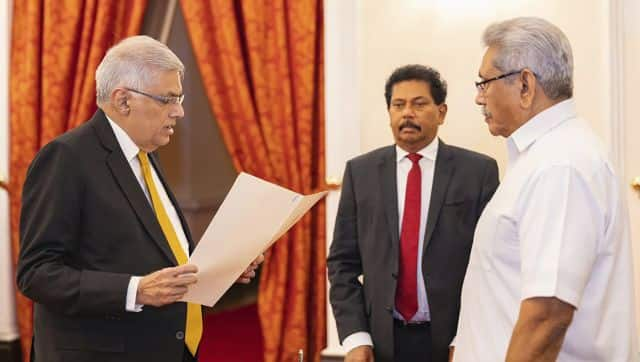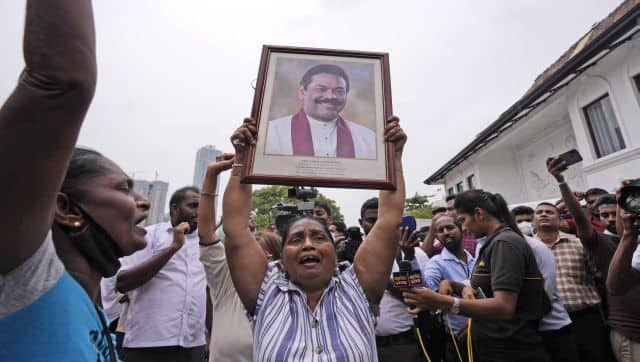Amid the worsening economic crisis in Sri Lanka, a new prime minister was sworn in on Thursday, 12 May – Ranil Wickremesinghe . He succeeds Mahinda Rajapaksa , who quit on Tuesday as protests in the island nation turned violent. Wickremesinghe’s appointment is an attempt by President Gotabaya Rajapaksa to quell the anger against the government, especially the Rajapaksa brothers, who the Sri Lankans hold responsible for leading the country to economic ruin . Hours after becoming PM, Wickremesinghe said, “I have taken on the challenge of uplifting the economy, and I must fulfil it.” The premier has a tough road ahead of him and though he’s a veteran politician this is the worst the country has seen since its independence in 1948.
I have taken on the challenge of uplifting the economy and I must fulfill it: Sri Lanka's new PM Ranil Wickremesinghe, in Colombo pic.twitter.com/73arzUeb9a
— ANI (@ANI) May 12, 2022
Wickremesinghe’s legacy The 73-year-old United National Party (UNP) leader has become the prime minister for the fifth time since 1993. But he has never completed a full term yet. On two occasions, he was dismissed by the president – in 2004 by Chandrika Kumaratunga and in 2018 by Maithripala Sirisena. He is now prime minister of an interim government and this term is also likely to be short, reports The Indian Express. Wickremesinghe is seen as a pro-West free-market reformist and his selection is an attempt to restore international credibility as the government negotiates a bailout package with the International Monetary Fund (IMF). The UNP leader has done his fair bit of firefighting for the country. He was first appointed prime minister in 1993 after the assassination of then-president Ranasinghe Premadasa, who was killed in a bomb attack by Liberation Tigers of Tamil Eelam (LTTE). His term lasted a year. He returned to power in 2001 and earned a reputation for sound economic management after steering the country out of recession. In 2002, he negotiated a ceasefire agreement with the LTTE as the country was ravaged by the decades-old civil war. The ceasefire was later annulled and while those were troubled times for Sri Lanka, the ongoing crisis in the nation and the political uncertainty is probably the most difficult challenge the new premier faces. However, Wickremesinghe’s “Mr Clean” image took a hit in 2015 after his government was rocked by an insider trading scam involving central bank bonds. The key accused, the central bank chief Arjuna Mahendran, was the PM’s schoolmate and choice for the job, reports AFP. His reputation was further damaged during his previous term as prime minister when he was in a difficult power-sharing arrangement with then-President Maithripala Sirisena. Conflict and a communication breakdown between them were blamed for intelligence lapses that led to Easter Sunday suicide bomb attacks in 2019 that killed more than 260 people. [caption id=“attachment_10668311” align=“alignnone” width=“640”]  Sri Lankan President Gotabaya Rajapaksa, watches Ranil Wickremesinghe take the oath of office as the new prime minister in Colombo, Sri Lanka, Thursday. Wickremesinghe has been accused of shielding the Rajapaksas in the past. Sri Lankan President’s Office via AP[/caption] The PM’s relationship with the Rajapaksas The veteran leader has been accused of backing the Rajapaksas and failing to act against members of the previous regime, who were accused of corruption. He is seen as someone who is close to the family and experts believe he has been picked because he would be likely to guarantee their security and any safe passage they might request, reports BBC. Interestingly, Wickremesinghe is the only member of the UNP in the Sri Lankan Parliament. After being sworn in he was asked by a British journalist how he could claim a mandate despite not having the numbers, the premier replied, “[Winston] Churchill had only four members backing him in 1939. How did he become the PM? Because of the crisis. I have done the same.” ‘Protests can get worst’ But Lankans are not too pleased. Opposition politicians and religious leaders objected to Wickremesinghe’s appointment, saying citizens wanted sweeping reforms. Opposition lawmaker Anura Dissanayake said the choice of Wickremesinghe was aimed more at protecting the president and his family from public anger over corruption allegations and his role in the economic crisis than it was at solving the country’s problems, reports The Associated Press (AP). Buddhist and Catholic clergy also objected to Wickremesinghe’s selection. “This decision has been taken totally disregarding the aspirations of the people who are protesting today. The protests can only get worse by this decision,” said Rev Omalpe Sobitha, a senior Buddhist monk. Catholic Archbishop of Colombo Cardinal Malcolm Ranjith called for “a complete change of the system” if Sri Lanka needed to emerge from the crisis. Political analyst Ranga Jayasuriya said that by appointing Wickremesinghe as prime minister, “President Gotabaya Rajapaksa did not put out the fire, but added fuel to it.” “People would be angrier with this snub of appointing a man who has no public support,” Jayasuriya tweeted.
By appointing @RW_UNP as PM, @GotabayaR did not put out the fire but added fuel to it.
— Ranga Jayasuriya (@RangaJayasuriya) May 12, 2022
People would be angrier with this snub of appointing a man who has no public support and who was a euphemism for failure.#SriLankaProtests #gotagohome
The appointment of the new PM has not diffused the anger against President Gotabaya even after he said that he pledged that he would give most of his executive powers in a televised speech to the nation on Wednesday. “The reforms he’s suggesting are not what we need. What we need right now is for [the president] to resign from office… It baffles my mind that Gotabaya Rajapaksa doesn’t understand that,” Kavindya Thennakoon, a protester in Colombo, told the BBC. [caption id=“attachment_10668321” align=“alignnone” width=“640”]  Sri Lankan government supporters clashed with peaceful protesters earlier in the week. AP[/caption] Political uncertainty continues The political impasse in Sri Lanka is far from over. On Tuesday, the Opposition will take up a no-confidence motion against Gotabaya in Parliament. It is spearheaded by the Samagi Jana Balewegaya (SJB), made up mainly of former UNP members who rebelled against Wickremesinghe under the leadership of Sajith Premadasa, reports The Indian Express. Premadasa was offered the position of the prime minister before Wickremesinghe but turned it down saying he would not step up as long as Gotabaya continued as president. Amid the political crisis, Sri Lanka remains nearly bankrupt and has suspended repayments of $7 billion in foreign loans due this year. The IMF has said any short or long-term assistance depends on the outcome of talks with creditors on loan restructuring. Sri Lanka must repay about $25 billion in foreign loans by 2026 out of a current total foreign debt of $51 billion, according to an AP report. Wickremesinghe faces a mammoth challenge. The man who compared himself with Churchill must also be remembering his famous words, “Never let a good crisis go to waste.” Now it remains to be seen if Wickremesinghe does justice to the people of Sri Lanka this time around. With inputs from agencies Read all the Latest News , Trending News , Cricket News , Bollywood News , India News and Entertainment News here. Follow us on Facebook, Twitter and Instagram.


)

)
)
)
)
)
)
)
)



